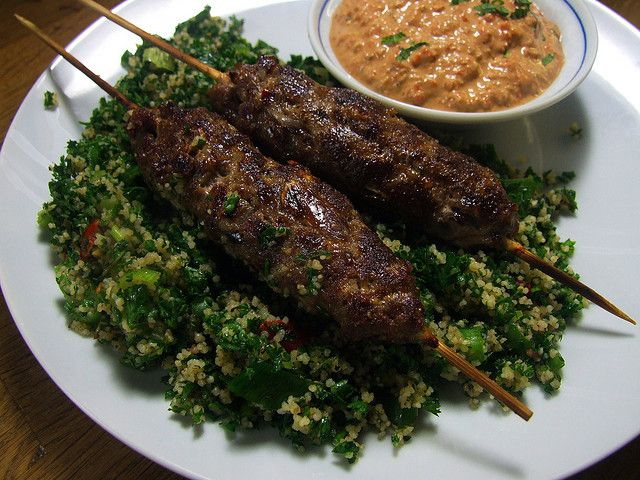
Making kofta in an air fryer
Balancing cultural identity as a second-generation American
“Dinner is ready!” The smells of tahini and allspice waft through my house, while plates and utensils clatter around the kitchen. My family meanders around the kitchen in hungry anticipation, like so many wolves circling their prey…
Growing up as a second-generation American, I primarily connected to my Egyptian heritage through food. From kofta and macarona bechemel, to tabbouleh and fūl, my parents shared their own upbringing and culture through the lens of the mealtime experience. My mother, herself born in Cairo but raised in Brooklyn, and my father, born in upper Egypt and schooled in Alexandria, brought their different interpretations (colored by their own experiences) on classic dishes into our family. While I have cherished enjoying sharing in the culinary tradition of my heritage, I always felt like an outsider to the full depth of Egyptian culture.
My experience as the son of a first-generation and second-generation American always left me floating between two identities; I never fully shared the heritage of my ancestry, nor did I feel at home in the normative experience of a fully assimilated American. As I grew older, keeping up with the traditions and culture of my grandparents and parents felt like swimming upstream, wading against the cultural current. It was increasingly easier to continue to adopt more of dominant, mainstream American culture. Why bother bringing stuffed grape leaves to school when I could just make peanut butter and jelly? PB&J elicited fewer scoffing questions and side-eyed glances from my classmates.
But I still felt something was missing.
During my final semester as an undergraduate student at the University of Delaware, I finally decided to take an introduction to Arabic course. While the course covered only the basics of the Arabic script, vocabulary, and grammar, it sparked something deep within me. Formally learning the language that I had heard spoken so effortlessly between my parents and grandparents was a revelation. This knowledge unlocked deeper meaning behind the traditions and customs that I knew before only on the surface.
My small class was stocked with a handful of other first-generation Americans in some way connected to Arabic-speaking countries and cultures. Together, we poured into the course, struggled with reproducing our professor’s beautiful script, and wrestled with our own unique experiences and backgrounds with Arabic language and cultures.
Out at lunch with my parents on a Saturday late in the semester, I was eager to show off my newly acquired conversational skills. To my parents’ joy, I held a (albeit elementary) conversation with them in Arabic for a few minutes for the first time in my life.
Proving I could carry a conversation gave me the confidence to connect Egyptian traditions to my 21st century American context. Recently, I cooked one of my family’s favorite dishes, kofta, on the air fryer in my FOB (fresh out the box) Ninja Foodie (a time-saving staple for any new graduate students reading).
Kofta over tabbouleh
Kofta, a delicious meat dish consisting of ground beef or lamb, chopped parsley, and chopped onions, is a classic Egyptian (and more broadly, Arabic) dish that my family has made probably a thousand times. Given its legendary enshrinement in the Attia Family Food Hall of Fame, the expectations were high. To all our surprise, my air-fried interpretation of the classic dish was one of the best batches of kofta we have ever had.
Although I will never be as Egyptian as my parents nor as American as my friends, I have learned to love my unique blend of Egyptian-American. My relationship with my cultural identity has grown to mirror, in some ways, making kofta in an air fryer. It is a union of traditional and new, straddling cultures and generations and continents. While that used to scare me, it is a role I now cherish. Wherever they maybe in their own cultural identity, I hope all first-generation and second-generation Americans learn to embrace their own blend of cultural identity by engaging with their heritage on a deeper level than they have before.
As I begin my PhD journey here at MIT, I (like all grad students) am bringing a unique cultural perspective and combination of experiences to campus. I also brought my air fryer.
Kofta Recipe
Ingredients
1 lb ground beef or ground lamb
1 medium onion, finely chopped
1 bunch of parsley, finely chopped
¾ -1 teaspoon salt
¼ -½ teaspoon pepper
¼ teaspoon allspice
Steps
- Mix ingredients well
- Form mixture into finger-length ellipsoids
- Cook batches for 20-25 minutes at 350 F in cooking appliance of choice
- Enjoy with rice and tabbouleh
Share this post:

